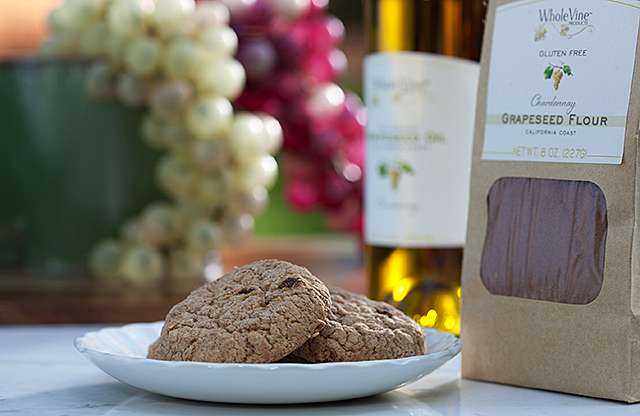At ARS’s Western Regional Research Center in Albany, California, chemists Wallace Yokoyama (left) and Glenn Bartley use real-time PCR to analyze the activity of lab animal genes that may affect cholesterol level. Credit: Peggy Greb
Home cooks and commercial bakers whose interests include using specialty ingredients may enjoy working with boutique flours made from a perhaps surprising source: wine grape seeds.
Agricultural Research Service chemist Wallace Yokoyama and colleagues have teamed with WholeVine Products, a northern California maker of varietal wine grape flours, to learn more about the potential health benefits of these unusual flours.
Right now, bakers typically blend these flours with others to make breads, cookies, or crackers. The studies that Yokoyama is leading may not only spark more interest in the flours, but may also lead to their use as a health-promoting ingredient in a broader range of foods.
That could help reduce the amount of wine grape seeds that today end up in cattle feed, compost, or landfills.
In a preliminary experiment, Yokoyama's team showed that blood cholesterol, hepatic steatosis (better known as "fatty liver"), and weight gain were reduced in laboratory hamsters fed high-fat, obesity-inducing rations spiked with flour milled from Chardonnay wine grape seeds, as compared to hamsters fed rations spiked with Cabernet Sauvignon or Syrah grape seed flour.
The research, documented in a peer-reviewed scientific article published in the Journal of Agricultural and Food Chemistry in 2014, is unique, Yokoyama says. Some earlier research conducted by scientists elsewhere has shown cholesterol-lowering and weight-control effects of extracts from mixtures of winemaking byproducts, such as grape seeds or skins. But Yokoyama says his team's study is the first to show that flour milled from whole grape seeds, minus most of their natural oil, is able to reduce blood cholesterol levels, particularly the "bad" LDL and VLDL cholesterols.
ARS scientists have teamed up with WholeVine Products, a maker of a variety of wine grape seed flours, cookies and crackers made with the flours, as well as grape seed oil. They have shown that Chardonnay grape seed flours reduce cholesterol and weight gain and modify gut bacteria in animal models of obesity. Credit: Peggy Greb
To learn more, the researchers looked for changes in the activity of several genes associated with obesity or with the way our bodies process (metabolize) fats and cholesterol. "We showed that leptin, typically high in obese individuals, decreased. Adiponectin, which is thought to help prevent diabetes and atherosclerosis, increased. We also found that lower activity of genes involved with cholesterol and bile acid production in the liver was associated with the lower levels of LDL, VLDL, and total cholesterol in the hamsters fed the Chardonnay seed flour rations."
Yokoyama chose hamsters as the laboratory model for this research because humans and hamsters absorb cholesterol from food, and synthesize it in the liver, in much the same way, Yokoyama says.
The hamster study paved the way for followup research now being conducted at the Mayo Clinic in Rochester, Minnesota, with volunteers. That research will determine whether the beneficial effects seen in hamsters also occur in humans.
That's not all. Using a leading-edge technology, Yokoyama's team is determining whether adding Chardonnay grape seed flour to rations fed to laboratory mice changes the kinds and amounts of bacteria dwelling in the animals' gut. The gut "microbiome," as it is known, is of interest to scientists worldwide because of the beneficial role that some gut bacteria may play in controlling obesity or reducing risk of type 2 diabetes, for instance. Yokoyama expects to publish results of the microbiome study later this year.
The grape seed flour research is part of ongoing studies at the ARS Western Regional Research Center in Albany, California—where Yokoyama is based—to develop new foods or food ingredients that help fight obesity and obesity-associated diseases.
ARS and WholeVine Products are seeking a patent for their grape seed flour discoveries.
Journal information: Journal of Agricultural and Food Chemistry
Provided by Agricultural Research Service






















